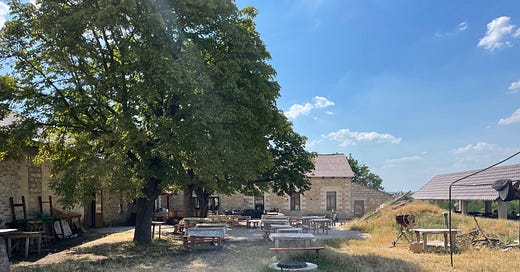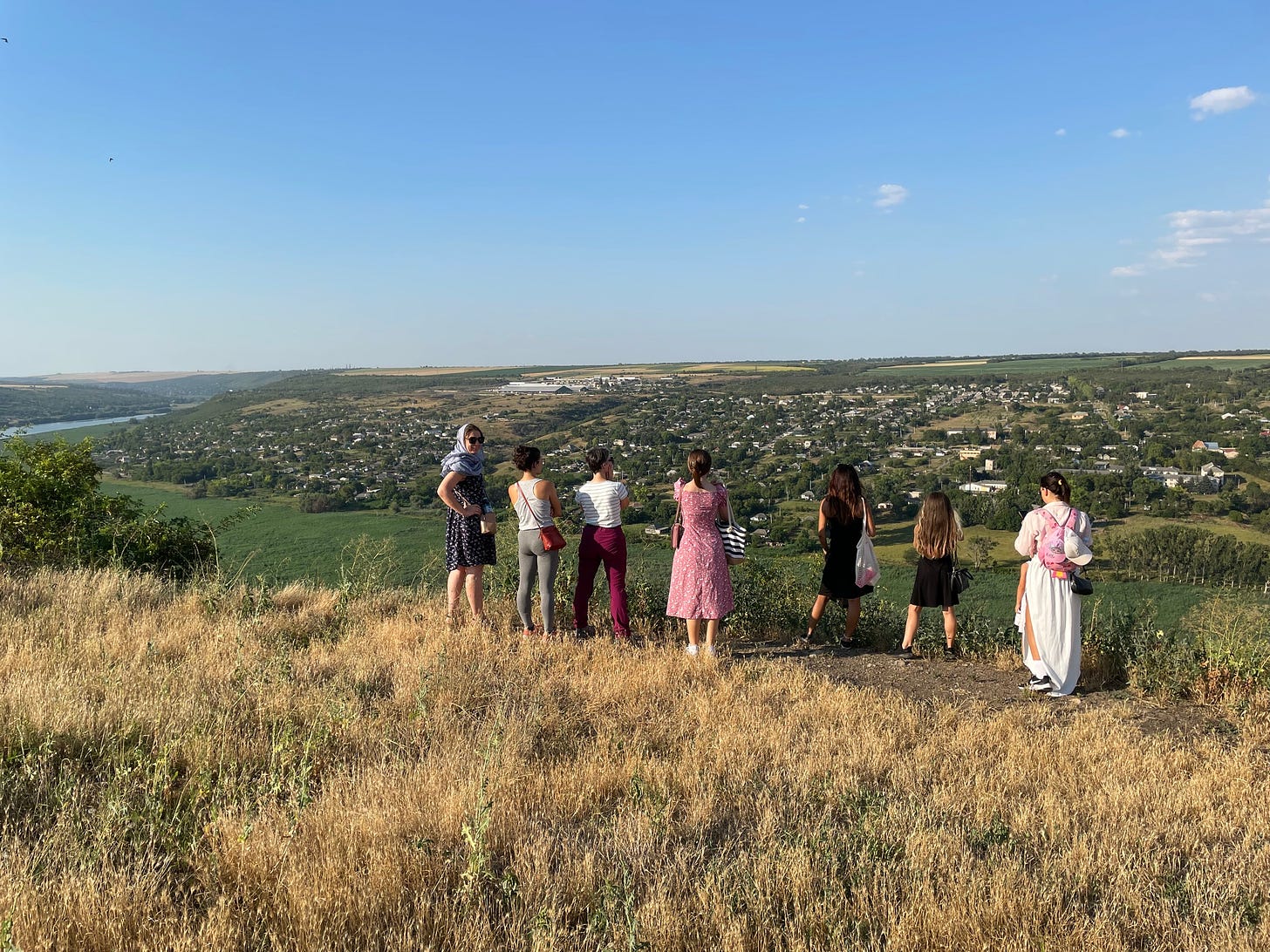Moldovan Summer Camp Offers a Respite for Ukrainian Mothers and Children
Journo Birds August 9th, 2024
Welcome back to Moldova Matters! This article is written by Journo Birds. Moldova Matters is collaborating with this team of journalists to share their stories about Moldovan culture and life. You can follow Journo Birds directly on Instagram, Facebook, YouTube or their website.
Four-year-old Vova hasn’t got used to air raid alerts. In the Ukrainian port-city of Odessa, where he lives with his parents and sister, they have become a daily occurrence.
“He usually reacts very strongly to these alerts,” his mother, 31-year-old Nadia Burenko, said worried. When Vova attends kindergarten, each siren means a trip to the bomb shelter. “This can happen anytime, for example while the kids sleep or play,” the young mother added.
Now Vova is spending a holiday in Moldova – a break from the daily disruptions caused by war. He and his mother traveled to the Moldovan village of Horodiste early in July. They’re attending a summer camp set up by the local organization Vent d’Est. “I came here to reset my mind,” Nadia said, as she overlooked a small valley of blue houses and lush gardens. Only the clucking of chickens, or the mooing of a cow interrupt the surrounding tranquility. “The most important thing is that, here, there is no war, there are no explosions,” she added.
Tatiana Pagu and Thierry Ernst, a Moldovan and French couple, have settled in Horodiste, about 100 km north from the capital Chisinau, after buying the crumbling building of the village’s former school. For ten years, they worked tirelessly with volunteers to bring it back to life. Abandoned classrooms were transformed into modern dormitories and a games room. “We rebuilt this school to transform it into an eco-pension and host people in need, disadvantaged children. Today we finally see the project come true,” explained Tatiana proudly.
When the war started in Ukraine, Tatiana and Thierry rushed to help refugees who were flowing into Moldova. As a neighboring country, Moldova was one of the places where war-affected families ran to for safety. During the first months of the conflict, the small country of 2.3 million inhabitants hosted over 1 million refugees. “Many people took their cars and went to the border to pick up refugees. Many opened the doors of their homes. It was sad and painful, but I was proud of my people, I felt the solidarity,” Tatiana remembered, her voice filled with emotion.
Vent d’Est, an organization mainly supported by private donors, also provides humanitarian aid directly in Ukraine. And as the conflict dragged on, Tatiana and Thierry couldn’t help but notice the long-term effects the war had on those who experience it daily, especially women and children, left behind by husbands enlisting or drafted into the armed forces. The objective of this summer camp was for mothers and children to come and rest, recover their strength and find peace, so that they can go back to their country with a different energy, Tatiana explained. For ten days, children get to do various activities from morning to night - while mothers enjoy the free time to take walks in nature, talk, meditate or just free their mind.
On top of co-running the NGO, Tatiana is also a certified kinesiologist. She specializes in the EMDR (Eye Movement Desensitization and Reprocessing) method to reduce post-traumatic stress symptoms. Her therapy sessions are included into the summer camp. Sometimes several hours long, they involve getting the patient to move her eyes in a specific way and rhythm while processing traumatic memories.
“My anxiety levels went down, and I have a clearer mind,” noted 36-year-old Alina Nizhnik on the morning after her first session. For Tatiana, a mother’s mental health is essential, partly because it will directly impact her ability to make her children feel safe. “It’s very important to take care of the mothers who raise their children alone. A mother is the first person of attachment for a child, especially because now fathers are often absent in Ukraine,” she explained.
A reality Alyona Slabadiniuk is well aware of. “My daughter is okay when I’m okay. When I panic, she panics,” remarked the young Ukrainian. She and 10-year-old Kira initially fled to Bucharest when the war started, then returned to Odessa, where Alyona opened her own dance studio.
International organizations have repeatedly warned about the toll the war is taking on children’s mental health. “The psychological effects of war among Ukrainian children are widespread. Half of 13 to 15-year-olds have trouble sleeping, and 1 in 5 experience intrusive thoughts and flashbacks — typical manifestations of post-traumatic stress disorder. Three-quarters of children and young people aged 14 to 34 recently reported needing emotional or psychological support,” reads an article published by UNICEF.
Alyona is trying her best to shield her daughter from the impacts of the war. “I want Kira to live a normal life. She goes to school and practices sports. She participates in gymnastics competitions and wins medals,” she said.
But finding a sense of normalcy in the war is a daily challenge. In Moldova, Tatiana and Thierry want to help children to find a glimpse of lightheartedness - something many lack in war-torn Ukraine. Energetic five-year-old Kira eagerly participates in every activity organized by the volunteers of the summer camp. Painting, baking, outings to a nearby amusement park… “Here, I see that my daughter is relaxed, we feel comfortable,” Alina Nizhnik observed.
Alina and Kira fled Kharkiv in March 2022, while the Russian and Ukrainian armies were fighting for control of the country’s second largest city. Adapting to their new home in Odessa took time, but they finally learned to appreciate its energetic vibe, colorful buildings and strong-minded people. For Alina, the daily power cuts, the stress and the uncertainty caused by the war has become a habit. “I realized that I wasn’t even paying attention to it anymore,” she admitted.
But despite these adaptation mechanisms, frustration is growing in Ukraine about the constraints linked to power rationing, the post-25 enlistment policy and economic hardships. While most support the response against the Russian invasion, impatience is growing to find a path towards peace.
“This war must stop. So many people died – and for what?” Alyona deplored.
President Zelensky said he is now open to discuss with Russia directly. He indicated that the war could end by the end of the year. Meanwhile, air attacks are continuing in several parts of Ukraine. Last week, at least four civilians were killed and several others wounded in Kharkiv, Izmail and Donetsk.
Will peace go hand in hand with a Ukrainian victory? For many, this is the only possible outcome. As the rockets fly by, kids are being born and faith for a better future prevails. Six months ago, Nadia gave birth to her second child, Miroslava. “We want our children to grow up under peaceful skies. And for Ukraine to win,” she stated, wistfully.






